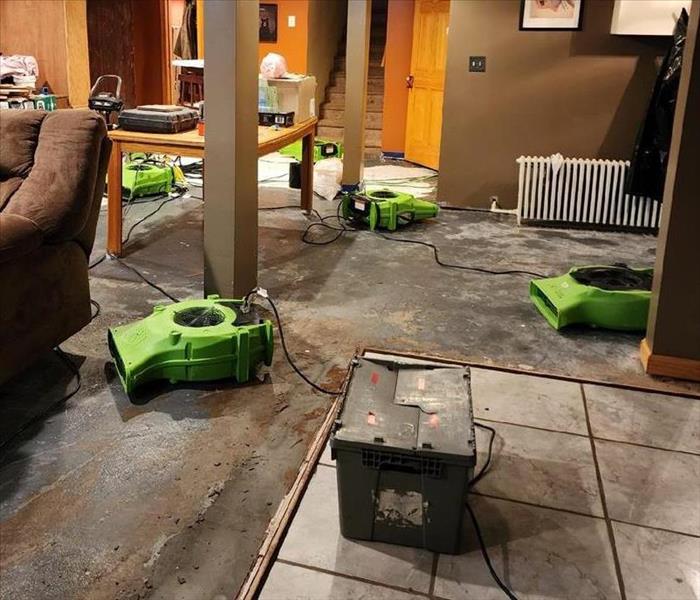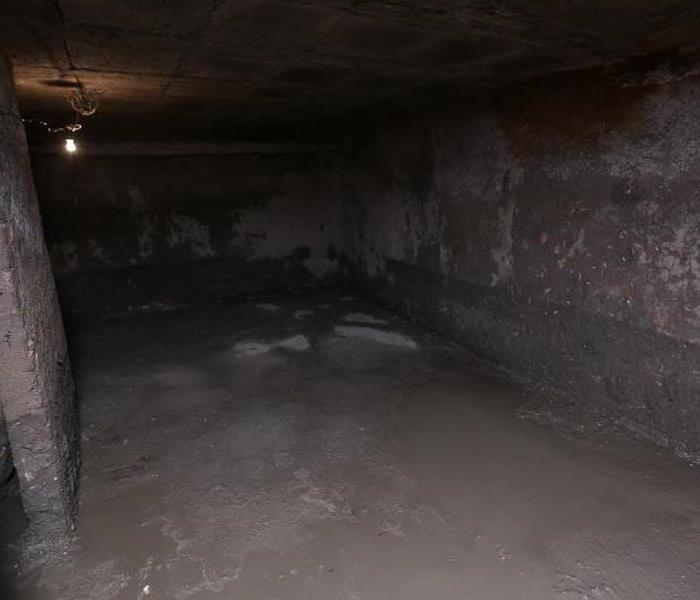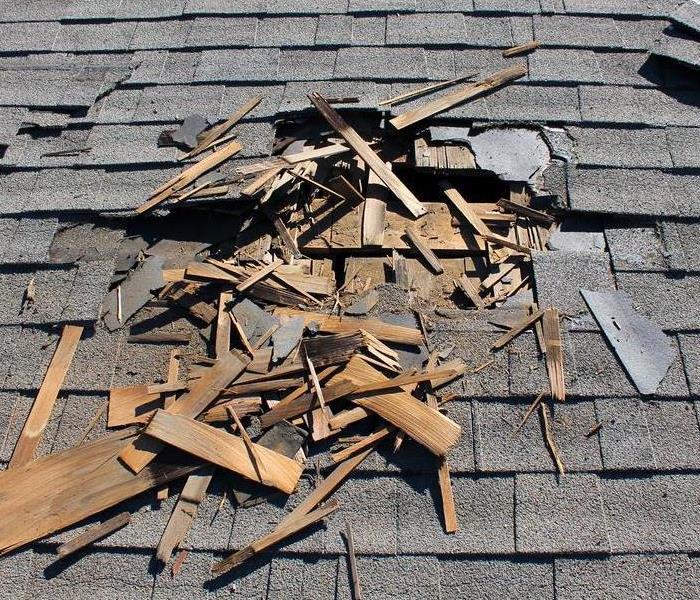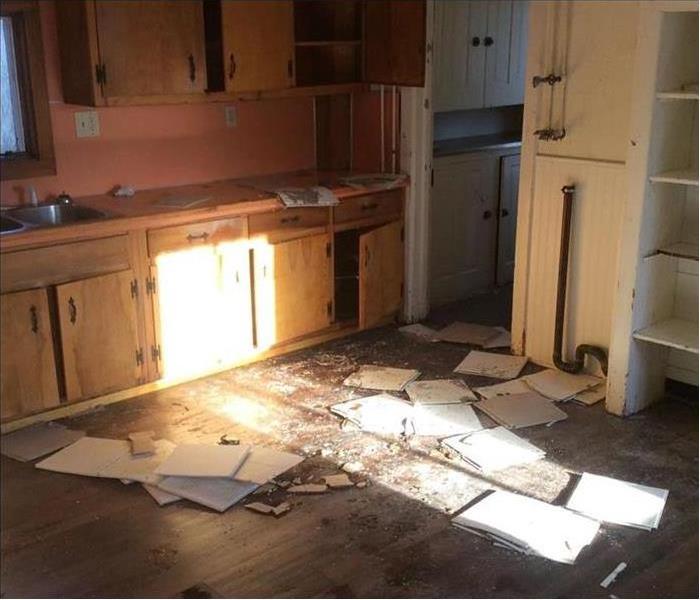Recent Water Damage Posts
Understanding the Risks After Flooding
10/21/2023 (Permalink)
 By taking these steps, you can stay safe and minimize the risks associated with flooding.
By taking these steps, you can stay safe and minimize the risks associated with flooding.
Flooding is one of the most severe natural disasters, with the potential to cause significant damage to homes, businesses, and infrastructure. In addition to the immediate dangers that floodwaters pose, there are also risks that must be considered in the aftermath. In this blog post, we will explore the risks associated with flooding and discuss ways to stay safe during and after a flood.
Safety Risks Associated with Flooding
- Electrical hazards: Floodwaters can pose electrical hazards, such as downed power lines in or near the water.
- Slip and fall hazards: Floodwaters and debris can create slip and fall hazards, especially in areas where the water has receded.
- Structural damage: Flooding can cause significant structural damage to buildings, infrastructure, and roads, leading to collapses, sinkholes, and other dangerous situations.
- Fast-moving water: If you are caught in fast-moving water, the force of the water can sweep you away, leading to drowning or other serious injuries.
Ways to Stay Safe During and After a Flood
Stay on top of the latest updates on the weather and flooding conditions by monitoring local news channels or the National Weather Service. If an evacuation order is given, follow it immediately- do not wait. Delaying can put you and your loved ones in danger.
Avoid walking or driving through floodwaters. Floodwaters can be much deeper than they appear, and you may be at risk of being swept away by moving water. Additionally, floodwaters may contain dangerous debris, obstacles, and animals.
Don't touch electrical equipment
Do not touch electrical equipment, such as downed power lines. Wash your hands frequently if you come into contact with floodwaters or items that have been in contact with floodwaters.
After the flood, conduct a thorough check of your property for any safety hazards, such as structural damage or electrical outages.
Flooding is a devastating natural disaster that can leave a trail of destruction in its wake. From property damage to health hazards, the risks associated with flooding are numerous and require the utmost attention. It is crucial to understand the dangers that arise after a flood and take necessary precautions to stay safe. Whether it's avoiding contact with contaminated water, wearing protective gear, or seeking professional help for debris removal, staying informed and vigilant in the aftermath of a flood is essential for safeguarding ourselves and our communities.
By prioritizing safety and taking proactive measures, we can bounce back stronger and minimize the risks posed by flooding. Flooding can be a life-threatening situation if you don't take the proper precautions. Remember to stay informed, follow evacuation orders, avoid floodwaters, watch for electricity hazards, practice good hygiene, and check for safety hazards. By taking these steps, you can stay safe and minimize the risks associated with flooding.
The Importance of Hiring a Certified Water Damage Expert
7/27/2023 (Permalink)
Water damage can be a homeowner's worst nightmare, causing extensive property damage, mold growth, and secondary damages. When faced with water damage, it's crucial to enlist the help of a certified water damage expert. These professionals possess the knowledge, skills, and equipment necessary to handle water-related emergencies effectively. In this blog post, we'll discuss the importance of hiring a certified water damage expert and the benefits they bring to the restoration process.
Expertise in Water Damage Assessment
Certified water damage experts have undergone specialized training and certification programs that equip them with a deep understanding of water damage and its impact on different types of materials and structures. They possess the expertise to assess the extent and severity of water damage, identify hidden moisture, and determine the appropriate restoration techniques.
Time is of the essence when dealing with water damage. The longer water sits and moisture remains, the higher the risk of structural damage and mold growth. Certified experts understand the importance of a prompt response. They have the necessary equipment and techniques to extract water, dry the affected areas, and mitigate further damage. Their quick action can significantly reduce the overall restoration time and minimize the potential for additional problems.
Comprehensive Restoration Solutions
Water damage can affect various aspects of your home, including walls, floors, ceilings, furniture, and personal belongings. Certified water damage experts offer comprehensive restoration solutions that encompass all these areas. They have the knowledge and experience to handle different materials and surfaces, ensuring a thorough and effective restoration process.
One of the significant risks associated with water damage is the potential for mold growth. Mold can begin to develop within 24 to 48 hours after water exposure. Certified experts understand the signs of mold growth, the necessary precautions to prevent its spread, and effective remediation techniques. They employ specialized equipment, such as air movers and dehumidifiers, to create an environment that discourages mold growth and ensures a safe and healthy living space.
Proper Equipment and Techniques
Certified water damage experts are equipped with state-of-the-art tools and equipment specifically designed for water extraction, drying, and restoration. They have access to moisture meters, thermal imaging cameras, industrial-grade dehumidifiers, and air movers that aid in identifying hidden moisture, promoting efficient drying, and restoring affected areas to their pre-damage condition. Their expertise in using these tools ensures optimal results and minimizes the risk of further damage.
Insurance Claim Assistance
Dealing with water damage can be overwhelming, especially when it comes to filing insurance claims. Certified water damage experts are well-versed in working with insurance companies. They can document the damage, provide detailed reports, and assist in navigating the claims process. Their knowledge and experience can help ensure a smooth and successful insurance claim, maximizing the chances of receiving fair compensation for the damage incurred.
Hiring a certified water damage expert provides peace of mind during a stressful time. These professionals have the necessary training and certifications to handle potentially hazardous situations safely. They prioritize your safety and the well-being of your property, adhering to industry standards and following proper protocols throughout the restoration process.
When faced with water damage, enlisting the services of a certified water damage expert is essential. Their expertise, prompt response, comprehensive solutions, and use of specialized equipment ensure efficient restoration while minimizing the risk of further damage and mold growth. With their assistance, you can navigate the restoration process with confidence, knowing that your home is in capable hands.
What can cause a flooded basement?
3/28/2023 (Permalink)
 Got a leak in your basement, we can help.
Got a leak in your basement, we can help.
Water damage is one of the most common types of property damage, and it can be caused by many different factors. Some are preventable, while others are not. Regardless of how they happen, water damage can have devastating effects on your home and belongings if you do not take care to address them immediately after they occur. Flooding in basements is a particular concern for homeowners, who rely on their basement to store some of their most valuable possessions as well as provide additional living space during times when all family members are at home full time. In this article we'll discuss some possible causes for flooding in basements so that you can better protect yourself from future incidents!
A foundation crack or other structural problem
If you notice cracks in the foundation of your home or basement, it could be a sign of a structural problem. Foundation cracks are often caused by water infiltration into the soil around the house and can lead to significant damage if left untreated. If you see any signs of cracking around your basement walls and floor, consult with an expert immediately, the sooner they're addressed, the easier they'll be to fix!
If you think there might be something wrong with your foundation but aren't sure where to start looking for problems, consider hiring an inspector who specializes in checking out foundations and other structures like basements. This way he or she will be able to identify potential issues before they become serious problems and help get them fixed quickly so everything stays solid underfoot
A broken sump pump or drain line
To prevent a flooded basement, you should make sure that your sump pump is connected to a drain. If it's not, it can cause water to back up in the house and flood the basement.
Also make sure that your sump pump is big enough for its job. If it isn't, then it may be unable to handle all of the water coming into your home and will overflow or break down, which will cause flooding. Finally, check out our guide on how to maintain and troubleshoot your sump pump so that everything runs smoothly!
A backed-up main drain or sewer line
If you suspect that your main drain or sewer line is backed up, there are a few ways to check. A good first step is to simply look for signs of flooding around the house. If there's water in places it shouldn't be, such as on the floor or outside in a yard, this could be an indication that something has gone wrong with your system. You'll also want to check along any exterior walls for leaks, if you see any discoloration or peeling paint near windows and doors, then there may well be some sort of issue going on underneath those surfaces.
If you find no visible signs of flooding around your home but still believe there might be some kind of problem with either your main drain pipes or sewer lines, it might help identify what caused them if we consider what other factors could have contributed.
A leak in your roof, wall, or foundation
If you have a leak, it's best to fix the problem as soon as possible. The longer you wait, the more damage can be done and the harder it will be to repair. Water damage can lead to a variety of other damages throughout your property if not addressed properly.
Flooded basements are often caused by leaks in roofs or walls, foundation cracks or settling ground around the house, or even bad plumbing work that has resulted in water seeping into your basement through cracks leading down there from upstairs bathrooms or kitchens.
Water damage can be prevented. If you suspect a leak in your home, it's important to act quickly and call a professional plumber. A leaking toilet or faucet may seem like an easy fix, but if left untreated for too long, it could lead to serious problems with your foundation or even mold growth. Always make sure that there are no cracks in the foundation before doing any repairs yourself. Give SERVPRO a call at the first sign of damage.
Six Tips To Protecting Your Home From Water Damage
2/24/2023 (Permalink)
 If you suspect a water loss in your home give SERVPRO a call today!
If you suspect a water loss in your home give SERVPRO a call today!
Water is one of the most dangerous threats to your home. It can cause thousands of dollars worth of damage in just a matter of hours and can even lead to mold growth. By taking a few simple steps, you can make sure your home stays safe from water damage every day and throughout the year.
Inspect your roof.
Check your roof for leaks. Roofs are one of the most common places for water damage to occur, so it's important to regularly inspect yours for signs of trouble. Look for damage that may have occurred due to a leaky roof or poor ventilation in your attic, such as mold growth on walls and ceilings near vents and light fixtures.
Inspect insulation around pipes and vents in the attic or crawl space; if it has become wet and moldy, remove it immediately (and replace it with new insulation). Look at wood framing members like joists that support floors above grade level; these should be inspected annually by a qualified professional who can determine whether they need repair or replacement due to rot or decay caused by moisture intrusion into the home's structure."
Check your gutters.
Gutters are a crucial part of preventing water damage in your home, so it's important to keep them clean. At least twice a year, check for clogs and blockage, if you find any, clean them out with a wire brush or cleaning tool designed specifically for this purpose (a stiff wire brush is ideal). If you don't have gutters but think they might be right for you and your home, consider installing them during the next rainy season.
Test your sump pump.
Test your sump pump. Sump pits are designed to collect water and then pump it out of your house, but sometimes they don't work as well as they should. To test yours, first, check the water level in the pit. If there's more than that or if you can't see any water at all, there may be a problem with your sump pump (or possibly even something blocking its intake). Then turn on and off your battery backup system while watching for any changes in water levels--if nothing happens when you turn off the power, this could mean that something has gone wrong with either your battery backup system or another part of its wiring setup. Finally, try turning off the power again while listening closely: if you hear gurgling sounds coming from inside one side of the house followed by loud clanking noises coming from beneath it over time (as though someone was emptying buckets full of rocks into an aquarium), then chances are good that there's something wrong with these pipes too!
Clean dishwasher, fridge, and washing machine hoses.
Dishwashers, fridges, and washing machines have a lot of moving parts that can get clogged with debris over time. This will lead to water leaks that may damage your home's foundation or cause mold growth inside the appliance itself. To prevent this from happening, clean all three appliances' hoses at least once per year by running hot water through them for several minutes (or until it runs clear). If you can't clean them yourself, consider hiring someone who has experience working with these appliances (like an HVAC technician) instead of trying to do it yourself.
Make sure hose bibs are insulated.
Hose bibs are the valves that control water flow in your home. They're often exposed to the elements, which means they can freeze in cold weather, crack in hot weather and rust during wet seasons. If your hose bibs aren't properly insulated, it's a good idea to replace them with ones that have built-in insulation or wrap them with foam pipe insulation before winter sets in. This will help keep them from freezing and bursting open under pressure when you turn on your sprinklers next spring!
Inspect the exterior of your home.
Inspect the exterior of your home. Check for cracks in the foundation, walls, and windowsills. Look for leaks around pipes or water heaters. Check all the sinks and faucets to ensure no small leaks that could potentially turn into larger water damage. Check for stains on ceilings that may indicate water damage caused by a leaky roof or plumbing system.
Water damage can happen at any time, so regular maintenance is the best way to protect your home. Inspect your roof, gutters, sump pump, and other exterior areas for leaks or signs of damage. Water damage can be a big problem for your home and your family. It's important to take steps to protect yourself against water damage by making sure that your home is properly insulated and maintained. If you suspect a water loss in your home give SERVPRO a call today!
What Effect Does Water Have on Building Materials?
11/21/2022 (Permalink)
 Water damage in a Sunbury, PA home.
Water damage in a Sunbury, PA home.
How Does Water Affect Building Materials?
Water can be one of the most devastating forces for destruction in the world. When water damage is not addressed quickly and properly, it can cause permanent damage to your home and belongings. There are many different types of building materials that can fall victim to water damage if not handled correctly. This article will explain some of the effects that water has on different materials and how you can protect yourself from them in your own home!
Here are some of the effects that water can have on different building materials.
Water can cause a variety of issues in building materials, but for the most part, it's more of an issue when water sits on the surface for an extended period. Water damage is usually noticed when there's a leak in your roof or window and you notice some water damage near those areas.
Water can also affect the structure of your walls by causing them to swell when it gets wet (especially with wood). The wood expands as it absorbs moisture from the air, but when this happens continuously over time, especially if there's not enough ventilation between the studs, then cracks may start forming in the structure of your walls which could lead to structural failure later down the road if it's left untreated.
Wood
Wood is a natural material and as such it has both advantages and disadvantages. When wood absorbs water, it expands. Therefore, you may find that a wooden doorframe becomes loose or even breaks when water gets into the frame. When wood dries out after being exposed to water, it shrinks and can cause the boards in your home to split or warp.
Wood can be dried slowly with fans, but this can take several days and during that time mold might form if adequate ventilation isn’t provided. If your house has been flooded by storm waters or heavy rains, you should consider using an electric dehumidifier instead of fans because they will dry out the wood faster than fans alone would do so.
Aluminum
Aluminum is a metal that can be affected by water, but it is not as sensitive to corrosion as some other materials. This does not mean that you should ignore your aluminum collection, however. If water damage has occurred, you will need to assess the damage and repair any permanent effects quickly.
Depending on how much time has passed since the original incident and how much exposure there was to moisture and/or chemicals in the environment, aluminum may suffer from oxidation or rusting. The best way to prevent further corrosion from affecting your building material is by removing all traces of oxygen from it and sealing it with a protective coating such as wax or paint.
Concrete and Masonry
Concrete and masonry materials are porous, meaning they can absorb water. When exposed to water, these materials can absorb it and expand. This is called hydration and causes the concrete to become soft. As the concrete expands it can crack or even crumble in some cases.
Steel
Steel is one of the most common building materials used in homes. Steel is generally immune to damage if they get wet, which means it can be used to build a wide variety of structures. Steel is also resistant to corrosion, which means it will last a long time if it is properly maintained.
When you have a water damage, it's important to act quickly so that your home doesn't suffer permanent damage!
If you have a flood, contact your insurance company immediately and let them know what happened. Don't let the water sit for too long or try to fix it yourself—that'll just make things worse. Call a professional water damage restoration company like SERVPRO of Lewisburg/Selinsgrove who can help get rid of all the moisture in your home and get everything back to normal again.
In conclusion, water can be very damaging to your Sunbury, PA home. It's important to act quickly when you notice water damage so that your house doesn't suffer permanent damage!
Please Do NOT Turn the Equipment Off!
4/13/2022 (Permalink)
Here at SERVPRO of Lewisburg/Selinsgrove we understand that having a water damage in your home or business can be overwhelming. On top of losing your possessions and having to potentially reconstruct your property, the equipment is noisy and can become bothersome. When you call SERVPRO of Lewisburg/Selinsgrove to mitigate your water damage, our professional technicians will place the recommended pieces of equipment in specific areas to dry it out as quickly as possible. It is VERY important to follow our instructions and keep the equipment running and in place at all times. Turning off or moving the air movers and/or dehumidifiers can delay the drying time and can cause further damage to your property such as it need it to be torn out and replaced, and even mold growth. Typically your insurance coverage will only pay for air movers and dehumidifiers for a certain amount of time and our technicians need adjuster approval beyond that time frame in order for your insurance company to pay. Our trained and certified technicians take moisture readings and monitor the equipment daily to ensure the appropriate placing and time for removal. Be sure to talk to our technicians if you have any concerns about anything on our jobs.
Are Clog Removers an Option?
4/8/2022 (Permalink)
When your drains are clogged, the first thing someone would think to do is reach for the clog remover. However, there are certain situations in which drain cleaner should never be used to prevent more damage from occurring:
Plastic Pipes
The chemicals in drain cleaner react together to transfer electrons to and from organic substances, causing them to break down. This process also produces heat- that's how they force their way down further into the pipe. These two factors mean that they can warp or eat through softer pipes, like plastic. The three types of cleaners you should stay away from if you do have plastic pipes are:
- Sulfiric or muriatic acid cleaners
- Lye or caustic potash cleaners
- Bleach, peroxide or nitrate cleaners
Old Pipes
Old pipes will have a lot of the same problems as plastic pipes, because they are brittle and delicate. If you discover that your pipes are old or rusting, you are probably better off replacing your plumbing rather than using a clog removing agent.
Total Blockage
Often, drain cleaners won't be able to clear a clogged drain if there is a solid mass of hair, oil or debris completely blocking the flow of air and liquid. If they are used in these situations, the cleaner ends up sitting there above the clog. Given enough time the strong chemicals may cause some real damage to your pipes.
Instead of chemical cleaner, you can try vinegar/baking soda and hot water, or biological options like a drain snake.





 24/7 Emergency Service
24/7 Emergency Service



